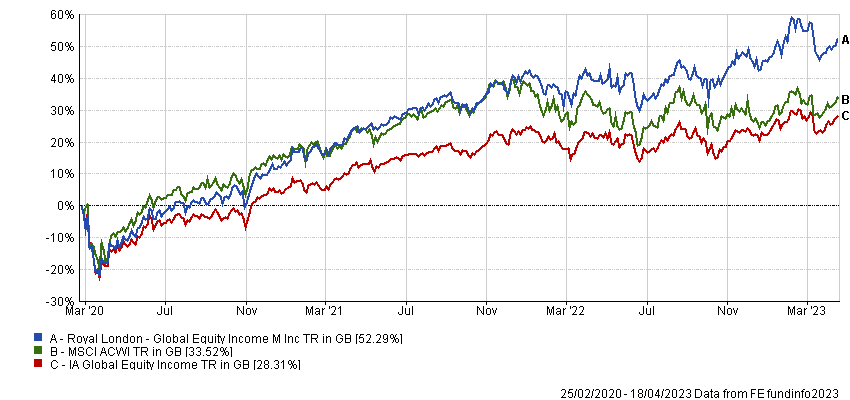If you ask any fund manager what characteristics they look for in a potential investment, top of the list is usually “quality”.
However, Niko de Walden has partly attributed the consistent outperformance of his Royal London Global Equity Income fund to his willingness to consider every type of business, including so-called ‘low quality’ ones with a low return on investment.
Performance of fund vs sector and index since launch

Source: FE Analytics
The manager uses a process called the lifecycle framework, which splits every stock in his investable universe into one of five categories: accelerators, compounders, slowing and maturing, maturing, and turnaround.
De Walden evaluates businesses in each one of these stages differently. For example, while he said he is “incredibly demanding” of compounders, he recognises those in the maturing category tend to only deliver a return on investment that is around the cost of capital.
“They don't have huge supernormal profits, so we’re making sure management realise they’re not running a growth company and aren’t trying to speculate or chance their arm with big investments – instead, we're grading their wealth creation on whether they’re reducing costs and taking out the rubbish bits,” he explained.
One example of a company that does this well is US steel producer Steel Dynamics, which de Walden said delivers a return just above its cost of capital throughout the market cycle.
“A growth manager would say, ‘this is a low-quality business in a grubby industry’,” he continued. “But when you look at Steel Dynamics, you quickly realise it makes an 8% return on investment against a cost of capital of 6%, in an industry where everyone else earns about 4%.
“While everyone else is destroying value with every investment they make, these guys are creating a little bit of value, which gives them better cashflow, lets them reinvest and just furthers their competitive advantages.”
While the performance of such a business is impressive when compared with its peers, the obvious question is why bother with this sector at all when the return on investment is so low?
De Walden said the answer comes down to valuations. For example, he said that everyone knows that Nestlé is a high-quality business that delivers strong returns on investment.
“That's why I paid 26x cashflows for it,” he said.
However, he contrasted this with Steel Dynamics, which trades at about 7x cashflows even though the stock has gone up by about 5x in the past few years.
Performance of Steel Dynamics stock (price only) over 3yrs

Source: MarketWatch
“Ultimately, if you can find businesses that are creating wealth for shareholders even though they are valued as terrible businesses because of their sector, or because people can’t get past the low absolute return on investment… you can get them on about a quarter of the valuations,” he added.
“Steel Dynamics has lots of little things it can invest money in to create further wealth, such as buying back stock, and it does all that off a low valuation with a strong balance sheet.”
Just as importantly, the manager said that mixing mature businesses in with compounders such as Nestlé smooths out his return profile and ensures Royal London Global Equity Income won’t surge in one market environment and collapse in another.
For example, he said that in 2020 when bond yields collapsed, it was the compounders that outperformed. Then, when these began to fall from “sky-high valuations” late last year, it was the mature cyclicals that helped him.
“It feels like a great time to be running a balanced strategy, as I would hate to be trying to make big calls right now,” he added. “When we run money in the global equity team, we're trying to take out the star manager [concept].
“We always feel disappointed if we're top of the charts in one year because that suggests we're taking a lot of risks from a relative point of view, whereas our clients want us to be consistent.
He added: “We’ll have bad years, but they’ll be bad because stockpicking was bad, not because we bet on the oil price or growth versus value.”





